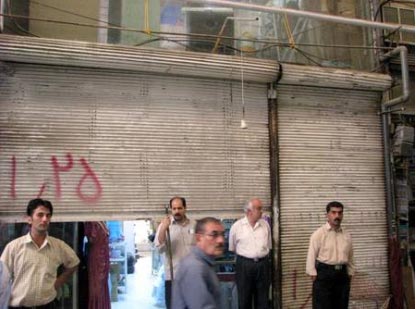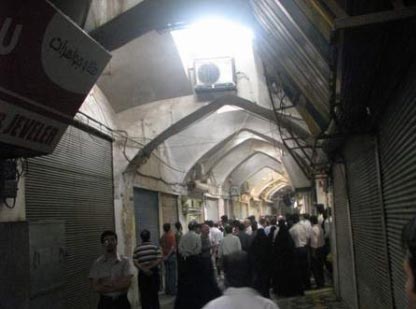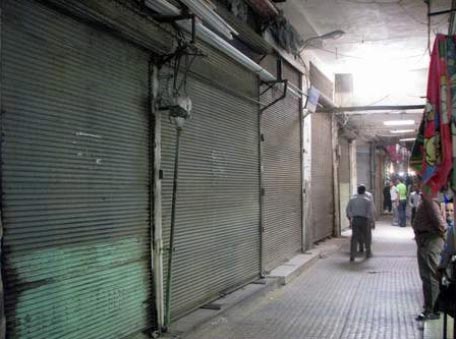Strike Follows Introduction of Value Added Tax (VAT)
The Iranian news agency ILNA reports that following the Iranian government's introduction of a value-added tax (VAT) in the country, the gold marketplaces in the cities of Isfahan, Mashhad, Tabriz, and Shiraz launched a strike today, and other business owners have joined in.
The strike began in Isfahan five days ago, and has now paralyzed the entire Isfahan marketplace, as well as other shops in the city center.
The Iranian daily Etemad reported that shopkeepers in the Isfahan market were threatening to close their bank accounts, and that the leaders of the bazaar had already begun withdrawing their funds from banks.
In an urgent report, the Iranian news agency Yari, which is close to supporters of Iranian Supreme Leader Ali Khamenei, stated that the regime's special forces entered the Isfahan marketplace after 500 to 1,000 merchants launched a silent demonstration. It was also reported that the city center and the main streets of the city were closed to traffic.
It should be noted that most of the media in Iran, and particularly in Tehran, have so far refrained from reporting on the strikes.
Meanwhile, in an updated report titled "The Government is Capitulating," ILNA quoted business council president Mohammad Azad as saying that "tax authorities have agreed to postpone the tax for six months, because the strike is going to take political form. In that regard, the tax office director has gone to Isfahan to discuss the matter with merchants." This comes despite the fact that Iranian Taxation Organization spokesman Mohammad Matin announced yesterday, October 7, that it was not possible to postpone the date of the implementation of the VAT. [1]
Historical Context
The spread of the bazaar strikes throughout Iran is of significance, especially if the strikes continue to spread, since it attests to an internal crisis, with potential political ramifications.
The leaders of the bazaar - Iran's biggest merchants - include senior ayatollahs, and are headed by Expediency Council chairman and former Iranian president 'Ali Akbar Hashemi-Rafsanjani, the main political rival of Iranian President Mahmoud Ahmadinejad. They have tremendous economic and political power.
Recently, there has been increased opposition in economic circles to the economic policy of Ahmadinejad, who has been particularly concerned with supporting his associates in Iran's Islamic Revolutionary Guards Corps (IRGC). Also, there has been increasing criticism of Ahmadinejad because of his inability to deal with the deteriorating economic situation in the country.
Historically, the bazaar merchants have always had tremendous influence in Iranian politics, and they are close to the important pressure group that led the social revolutions that preceded the 1979 Islamic Revolution.
Bazaar merchants also played a particularly prominent role in the 1905-6 tobacco revolt against Shah Nasseredin (of the Qajar dynasty), after the Shah decided to give the franchise of growing Iran's tobacco and marketing it at a very low price to an American merchant. The bazaar leaders, together with senior ayatollahs, launched a country-wide strike, forcing the Shah to back down from his decision.
With the formation of a coalition of forces forming against Ahmadinejad, comprising bazaar merchants and ayatollahs who have been hard-hit economically and politically by recent economic decisions by Ahmadinejad's government, the power struggle in the Iranian leadership is heating up.
This power struggle is reflected in the deep-seated personal political rivalry between Rafsanjani, who is from the founding generation of the Islamic Revolution and who holds many key posts in the regime, and who is even considered the No. 2 man in the leadership - and Ahmadinejad, who has challenged the traditional leadership of the revolution and is trying to launch a "second Islamic revolution" in Iran (see MEMRI Inquiry and Analysis No. 430, "Power Struggle in Iran - Part IV: Staged Majlis Elections, Elimination of Reformist Political Representation, Abolition of 'Rule of the Jurisprudent,'" April 2, 2008, Power Struggle in Iran – Part IV: Staged Majlis Elections, Elimination of Reformist Political Representation, Abolition of 'Rule of the Jurisprudent' ).
These developments may also be a challenge to Iranian Supreme Leader Ali Khamenei, who recently publicly expressed his support for President Ahmadinejad, and called for his reelection.
Below are photos from the strike at the bazaar in the city of Qazvin, in northwestern Iran.
(Photos: Tabannews.net http://tabannews.net/totla.php?id=2931 )




[1]Yari, Etemad, Kargozaran, Iran, October 8, 2008; ILNA, Sarmayeh, Iran, October 7, 2008.





